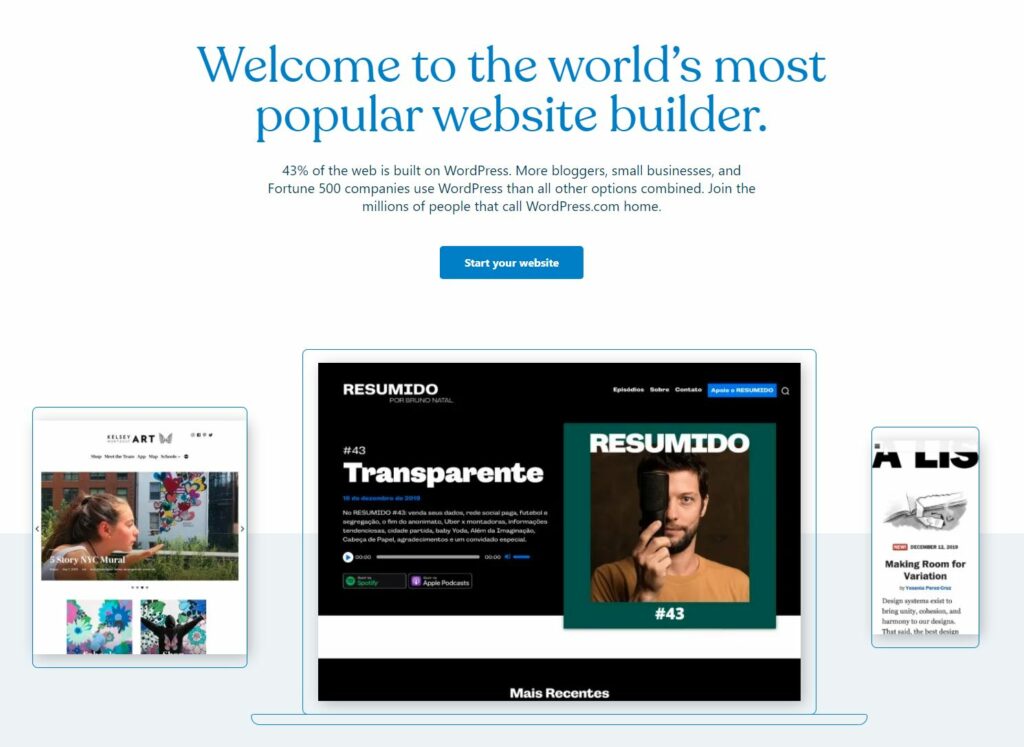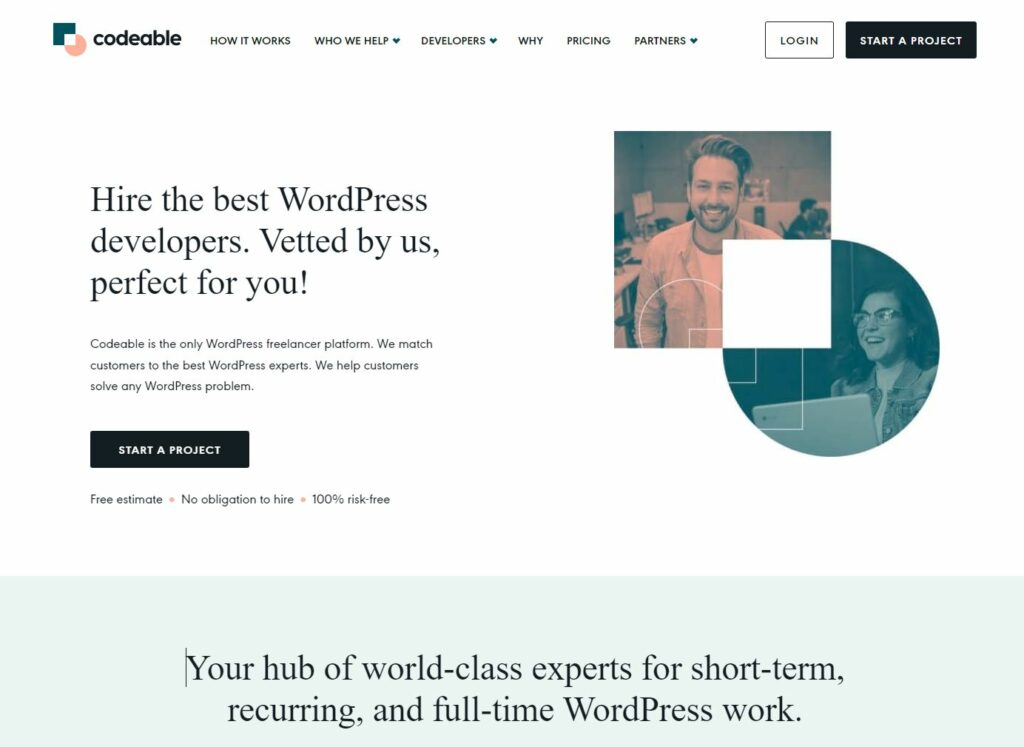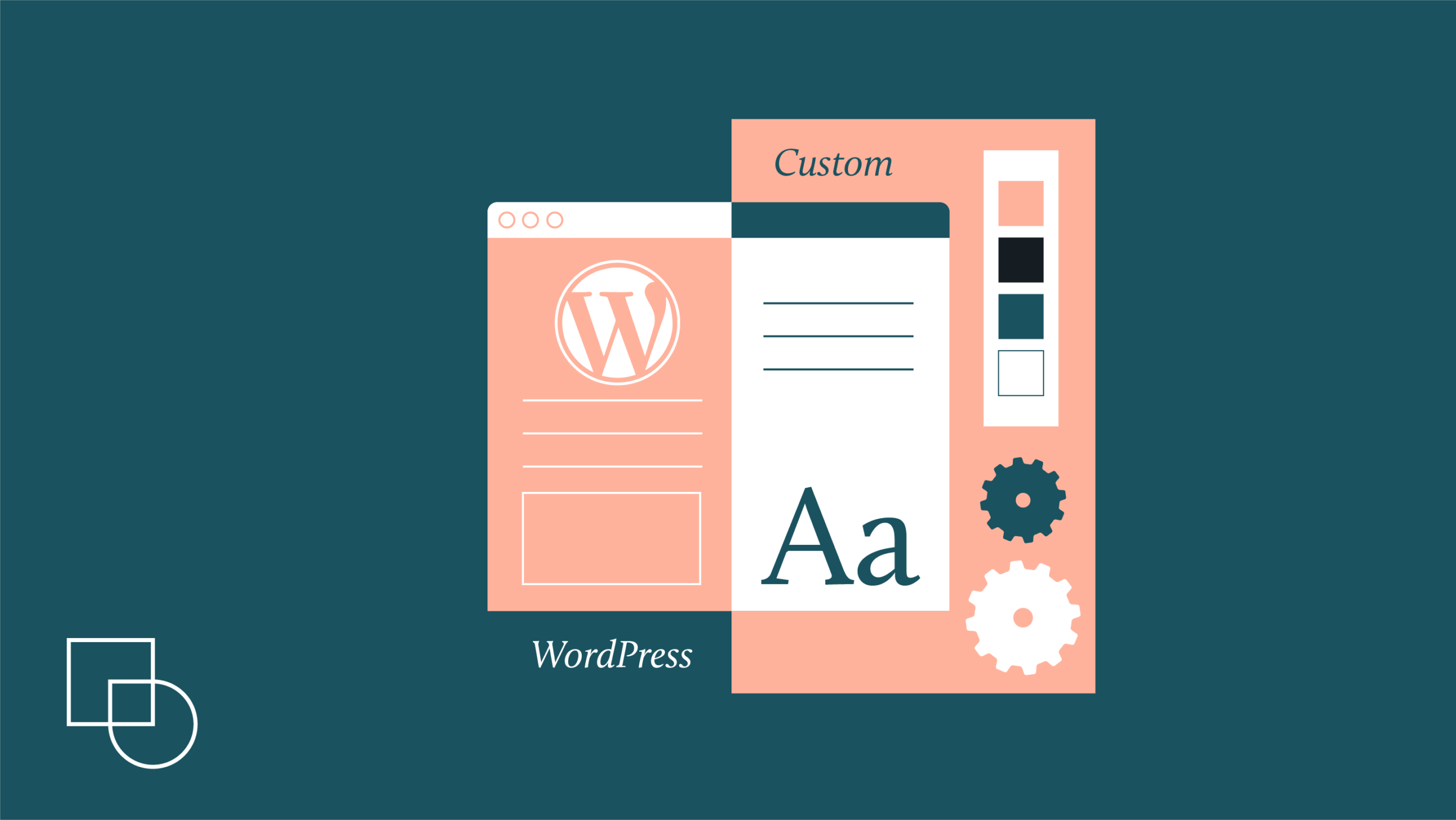Choosing between WordPress and custom website development is one of the most important decisions for your online presence. This decision shapes not only how your site looks, but also how it performs, scales, and grows with your business.
WordPress is one of the most popular Content Management Systems (CMS) in the world. In fact, it powers 43.4% of all websites on the Internet today! There are many reasons that explain its success; the platform is easy to use, developers are constantly creating plugins to support new functionality, and there’s plenty of documentation around to help you solve any issues you might encounter. It’s no surprise that many people choose it to create shops, blogs, and all sorts of websites.
The default WordPress installation is already quite powerful. However, if you want to customize your site beyond what the platform offers right out of the box, or you want to build your website entirely from scratch, you might be wondering if you should hire a web designer to help you turn your ideas into reality.
In this article, we will explore the benefits of using WordPress or hiring a web designer to create the perfect site and help you decide which option is best for your business. And, since we’re at it, we will also show you how you can get the best of both worlds using Codeable!
Building a website with WordPress vs. making a custom site: An overview
Let’s take a quick look at what using WordPress or creating a custom website actually entails.
Why build a WordPress website?
WordPress is an open-source and user-friendly CMS that powers websites and online stores through themes, plugins, and block-based editing.
For many website creators, WordPress is an obvious choice of CMS because the platform makes it extremely easy to create a powerful site in a short amount of time. Especially nowadays, users will benefit from modern capabilities like Full Site Editing (FSE), block-based architecture, and AI-powered tools that help with content generation, SEO optimization, and even visual design.
There are two ways in which you can access this open-source platform. The first is to download and install it yourself (this is relatively straightforward, provided you know how to set up your own hosting and work the backend). The majority of users, however, will find it’s simply easier to use a managed host that meets WordPress’s requirements and includes all optimizations, such as Kinsta. Choosing this method means that the system will take care of the installation all on its own, so you can instead focus on conversions!

WordPress advantages
- Cost-effective: WordPress is free to download, with hosting starting at $5–50/month, making it one of the most budget-friendly CMS options.
- User-friendly: Intuitive dashboard, block-based editor, and visual design tools lower the barrier for beginners.
- Fast development: Pre-built themes and plugins allow for rapid site deployment in days or weeks.
- SEO-friendly: Built-in SEO structure with powerful plugins like Yoast and Rank Math for optimization.
- Community support: Over 60,000 plugins, global developer ecosystem, and extensive documentation.
- AI integration: Modern AI builders streamline content creation, site optimization, and even personalized UX.
WordPress disadvantages
- Security vulnerabilities: 96% of WordPress vulnerabilities come from plugins or themes. Constant patching is essential.
- Maintenance burden: Frequent plugin, theme, and core updates are needed to keep the site secure and functional.
- Dependency risks: Third-party plugins can be abandoned or break compatibility, creating long-term reliance challenges.
Why build a custom website?
A custom website is a digital platform built from scratch, often using HTML/CSS along with React frameworks or a Jamstack architecture.
There are many reasons why people might opt for custom websites, but the main one has to do with having maximum control and customizability. If you can start from zero, you can create all your pages with the exact look and functionalities you need. This is a particularly tempting option if you want to build a very complex website or have your pages, forms, or navigation be somewhat unique.
Professional developers use platforms like Vercel and Netlify to deploy custom websites. However, unless you are a website developer yourself, you will need to hire a freelancer or work with a web development agency.
Custom website advantages
- Complete customization: Unlimited design flexibility, tailored functionality.
- Enhanced security: Smaller attack surface with custom configurations instead of third-party plugins.
- Technical control: Fine-grained SEO optimization, advanced schema, and custom integrations.
- Unique branding: A bespoke design that stands apart from template-driven sites.
Custom website disadvantages
- Higher initial cost: $15,000–50,000+ upfront investment is typical for custom builds in 2025.
- Longer development time: Projects often take months, compared to days/weeks with WordPress.
- Technical expertise required: Developers are needed for both build and ongoing maintenance.
- Ongoing developer dependency: Any updates or functionality changes require skilled assistance.
- Limited community support: Unlike WordPress, there’s no massive plugin ecosystem – custom solutions mean custom maintenance.
WordPress vs. a custom website: Detailed comparison
So, the time has come to make a decision: Will you use WordPress, or will you hire a designer or developer? At this point, you might still not be sure. To make the choice easier, here’s a quick side-by-side comparison of both approaches.
| Feature | WordPress | Custom website |
| Cost | Free software, hosting $5–50/month, themes & plugins affordable. | $15,000–50,000+ upfront investment. |
| Customization | Flexible with themes, plugins, Full Site Editing, custom coding, and more. | Unlimited flexibility with custom code, frameworks, and integrations. |
| Performance | Can achieve excellent performance when properly optimized, but faces inherent challenges due to their plugin-dependent architecture. | Typically offer superior performance potential because they’re coded specifically for their intended purpose without the overhead of unnecessary features |
| Security | 96% of vulnerabilities come from plugins/themes. Requires updates, expertise, and optimization. | Smaller attack surface; custom security configurations. |
| SEO | Built-in SEO features + plugins (Yoast, RankMath). | Full technical SEO control; schema, custom optimization. |
| Scalability | Handles moderate growth well. Enterprise-scale can be attained, depending on expertise and optimization. | Built for scale; frameworks and CDNs support large growth. |
| Maintenance | Frequent updates for plugins, themes, and core. | Developer-dependent for updates and fixes. |
So, here are a few things small business owners and bloggers should consider when comparing the two (but keep reading, because there is a third option ahead!).
Website costs and time requirements
WordPress costs and time requirements
WordPress offers low-cost website creation with free software and hosting starting at $5–50 monthly. It’s generally considered an affordable choice.
First of all, it’s free to download the software – although you need to be aware that the cost of your website will depend more on hosting fees, the theme you pick, and the plugins you use (which you will typically pay as a monthly or annual fee). However, a WordPress site is almost guaranteed to be the more cost-effective option in all cases.
It usually takes less time to get a WordPress website live. Themes and plugins provide most functionality out of the box. This enables site deployment in days or weeks.
However, WordPress requires a learning curve to set up your website by yourself. You must learn to create pages, add content, and manage plugins. This takes effort at first, but saves time in the long run.
Custom website costs and time requirements
Custom websites require significant upfront investment, starting at $15,000–50,000 for professional development. That’s because there is so much more work involved. Most people are able to install a WordPress site themselves (and make some basic pages and posts), but you will have to get a professional involved if you want to build a custom site without a CMS.
So, creating a website tends to take more time – especially if the developer you hire has lots of other contracts to see to. But this is not set in stone, and it will depend on the type of project you have and the contractor you hire.
Scalability and growth
WordPress scalability
WordPress has recently matured significantly as an enterprise-capable platform. However, it heavily depends on the user’s expertise and optimization.
Custom website scalability
Custom websites are designed for scalability with an architecture that grows with business needs.
Modern frameworks (Jamstack, React, Next.js) and cloud hosting providers (Vercel, Netlify, AWS) make scaling efficient. These sites handle complex requirements and enterprise traffic without major architectural changes.
Customizability and flexibility
WordPress customizability and flexibility
WordPress provides customization through themes and plugins with visual editing capabilities. Your site’s design foundation comes from its theme. Plugins and page builders like Elementor allow visual customizations. Full Site Editing (FSE) enables design changes directly with blocks.
Modern themes are mobile-responsive and SEO-optimized by default. However, some limitations exist:
- Some plugins may not fully match your design vision.
- Compatibility issues can arise between themes and plugins.
- Too many plugins can slow down your site.
- You may sometimes find a plugin that approximates what you want to do but doesn’t work exactly how you want it to. For example, you will find plenty of options for a product table plugin, but you might not find one that creates product tables that totally fit your website’s aesthetic.
- Your chosen plugins might not always work well with your theme, which can lead to compatibility issues that can result in site errors.
- You might install a plugin that has the functionality you need but also includes lots of other features you don’t use. Although this is not an issue per se, this can easily slow down your site, especially if you have many active plugins.
Custom website customizability and flexibility
Custom websites offer unlimited design flexibility with complete control over functionality and appearance.
You will always have more flexibility if you choose to build a custom site using a skilled developer who can create anything you want. And you won’t have to settle on a particular theme or use plugins that get you close to a feature but ultimately become a compromise on your ideal site design.
You also need to keep in mind that every time you want to make a functional change to your website, you will need to go to a developer again (ideally, the same person who created your website). This could become a costly expense and also take some time, depending on other commitments your developer has or how difficult it is to find a trustworthy person.
SEO capabilities
WordPress SEO capabilities
WordPress comes with a strong foundation for SEO, especially when paired with its plugin ecosystem:
- Clean permalink structure: URLs can be customized to include keywords and remain human-friendly (e.g., /seo-tips instead of /?p=123). This helps search engines and users quickly understand what the page is about.
- SEO plugins like Yoast and RankMath: These provide on-page analysis, XML sitemap generation, and easy meta title and description editing. For example, Yoast gives real-time feedback on readability and keyword usage, making it beginner-friendly.
- Mobile-responsive themes: Since Google prioritizes mobile-first indexing, WordPress’s vast theme library ensures that most sites automatically adapt to different screen sizes.
- Metadata and schema integration: With plugins or theme features, users can add structured data (like FAQs or product details), which can lead to rich snippets in search results.
As you can see, WordPress lowers the barrier to SEO by offering tools that make optimization accessible, even for non-technical users.
Custom website SEO capabilities
Custom websites, on the other hand, provide total flexibility for SEO:
- Fine-grained control of code and structure: Developers can build semantic HTML, custom heading structures, and lean markup, ensuring nothing unnecessary slows down crawling or indexing.
- Custom metadata and structured data: Instead of being tied to plugin templates, you can tailor schema markup (e.g., for local businesses, recipes, or job postings) to maximize visibility in SERPs.
- Performance optimization for Core Web Vitals: Because you control the codebase, you can eliminate bloat, lazy-load media, and optimize for metrics like Largest Contentful Paint (LCP) and Cumulative Layout Shift (CLS), which directly impact rankings.
- Advanced technical SEO implementations: Features like multilingual SEO, custom redirects, edge caching, or AMP pages can be integrated based on the site’s unique needs.
This level of control makes custom websites better suited for businesses in competitive niches or those with complex technical SEO requirements.
Performance and speed
WordPress performance and speed
WordPress performance heavily depends on implementation quality rather than the platform itself. A well-optimized WordPress site can achieve excellent performance and even reach enterprise-scale, but faces inherent challenges like:
- Database overhead: WordPress sites accumulate significant database bloat over time, including post revisions, spam comments, transient options, and orphaned metadata. This bloat can dramatically slow query performance. Proper database optimization can reduce page load times by 30-40%.
- Plugin impact: Each plugin adds processing overhead, with some plugins having severe performance implications. Popular page builders like Elementor and resource-intensive plugins can significantly impact both memory usage and PageSpeed scores.
- Theme dependencies: WordPress themes, particularly feature-rich ones, often include unnecessary code and scripts that load on every page request. Many themes prioritize visual appeal over performance optimization, leading to slower load times.
Custom website performance
Custom websites achieve excellent performance through pre-rendered static files and optimized code architecture.
Jamstack and modern frameworks serve content via CDNs. These sites load faster by default than CMS-based builds because performance is baked into the architecture.
Security and maintenance
WordPress security
One of the big draws of WordPress is that its maintenance is typically quite easy. WordPress releases new versions often (these tend to improve security and user experience), and plugin and theme developers their own updates for their products.
When choosing WordPress for your site, you will need to learn how to perform these platform and plugin updates to minimize bugs and loading issues on your site. You should also learn how to perform site backups and other maintenance tasks to make sure you always have a copy of your content in case something goes wrong (if you fear it might, there are also lots of plugins you can use that make your website more secure, like Jetpack).
Your WordPress host will likely help you if you have any security concerns, too. They also tend to offer WordPress core updates, regular site backups, data encryption, and more directly from the server. However, keep in mind none of these are foolproof solutions. All websites have vulnerabilities, so if your WordPress site has a bug, such as an internal server error, you should always be cautious and get a developer involved to fix it.
Custom website security
Custom websites provide enhanced security through reduced attack surface and tailored protection measures. Also, a good website developer will take all measures necessary to ensure your website is secure. For example, they can set up firewalls, SSL certificates, website scanners, and more.
One thing to keep in mind, however, is that it may be more challenging to conduct site maintenance without the help of experts. It’s always a good idea to get your developer to document everything they do on your custom site, so you can have a trustworthy source of information about your website and everything it contains.
The best solution? Using WordPress and Codeable
Professional web developers use both WordPress and custom development, depending on project goals. For example, WordPress is often chosen for content-heavy sites, blogs, and eCommerce projects where speed-to-market and cost efficiency matter most. On the other hand, custom builds are preferred for performance-critical platforms, enterprise apps, or highly specialized functionality.
If we had to make a recommendation when it comes to WordPress vs. custom website development, we would say WordPress is probably the safest option for most people. The platform offers good enough flexibility and customizability, at least for the majority of site needs. It’s also easy to use, it tends to be more cost-effective, and you can usually work on your website and maintain it yourself (plus, there are a lot of tutorials and documentation on the Internet on how to do certain everyday things and fix issues within the CMS).

This being said, there are many instances in which you may want to use a developer to improve what a default WordPress site can do. These are just a few of them:
- If you don’t have time to create your website and research the themes and plugins you need, a WordPress developer can help you pick the best options while still keeping things more cost-effective than if you built a totally custom website.
- If you want a really specific functionality that you can’t get with your current theme or plugins, a WordPress developer can modify them, create new templates, or come up with entirely new functionality for your site.
- If you have a security issue that you don’t know how to fix, a WordPress developer will be able to identify the error for you and handle it for you.
Codeable is a WordPress developer hiring platform with a pool of over 700+ developers that can make any modification to your WordPress site easy. These experts can also handle any site issues you may have as soon as you find them.
The way the platform works is very straightforward. All you need to do is submit your brief, and you’ll get matched with one to five experts in just a few hours. Then, you can chat with them to ask all the questions you need to and decide who you want to work with. That’s it! Your project will be fully scoped within 24 hours!
Build your website with WordPress, and improve it with Codeable!
Without a doubt, WordPress is considered a top platform for creating a new website. It’s a powerful CMS filled with attractive themes, and you can usually get all the functionality you need using third-party themes and plugins.
If you want to do something on your WordPress site but know you can’t achieve it without a bit of help from a developer, here’s where Codeable comes in handy. Through this WordPress developer platform, you can create WordPress sites from scratch to your exact specifications or add any functionality to your pre-existing site.
Submit your project today and find out how Codeable can improve your WordPress site!

 Dream It
Dream It

